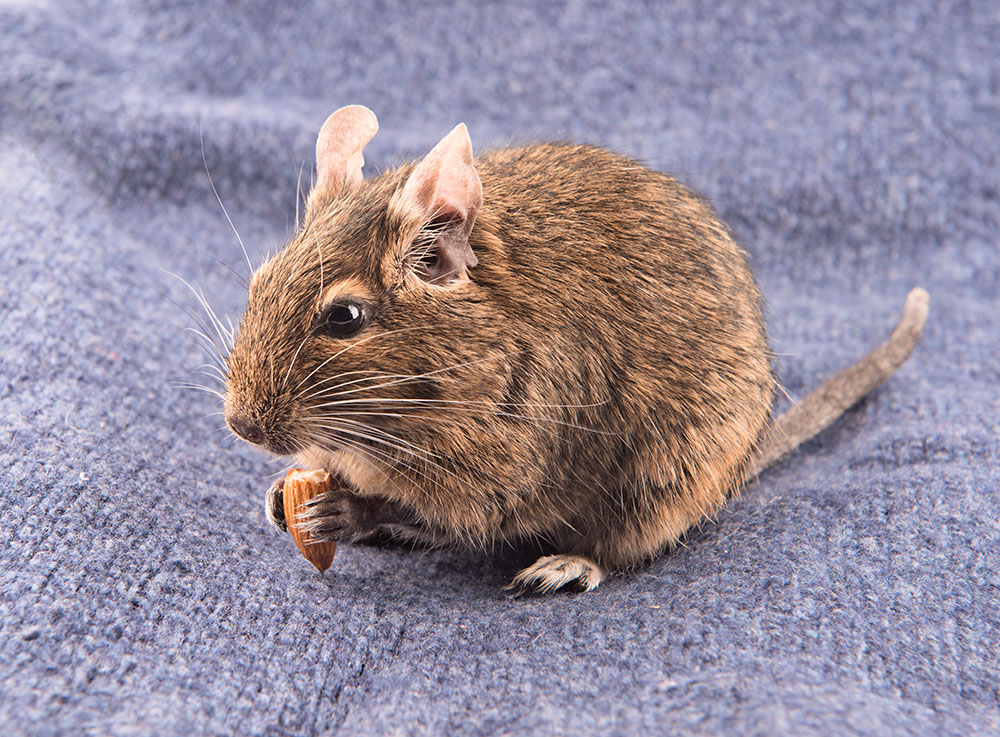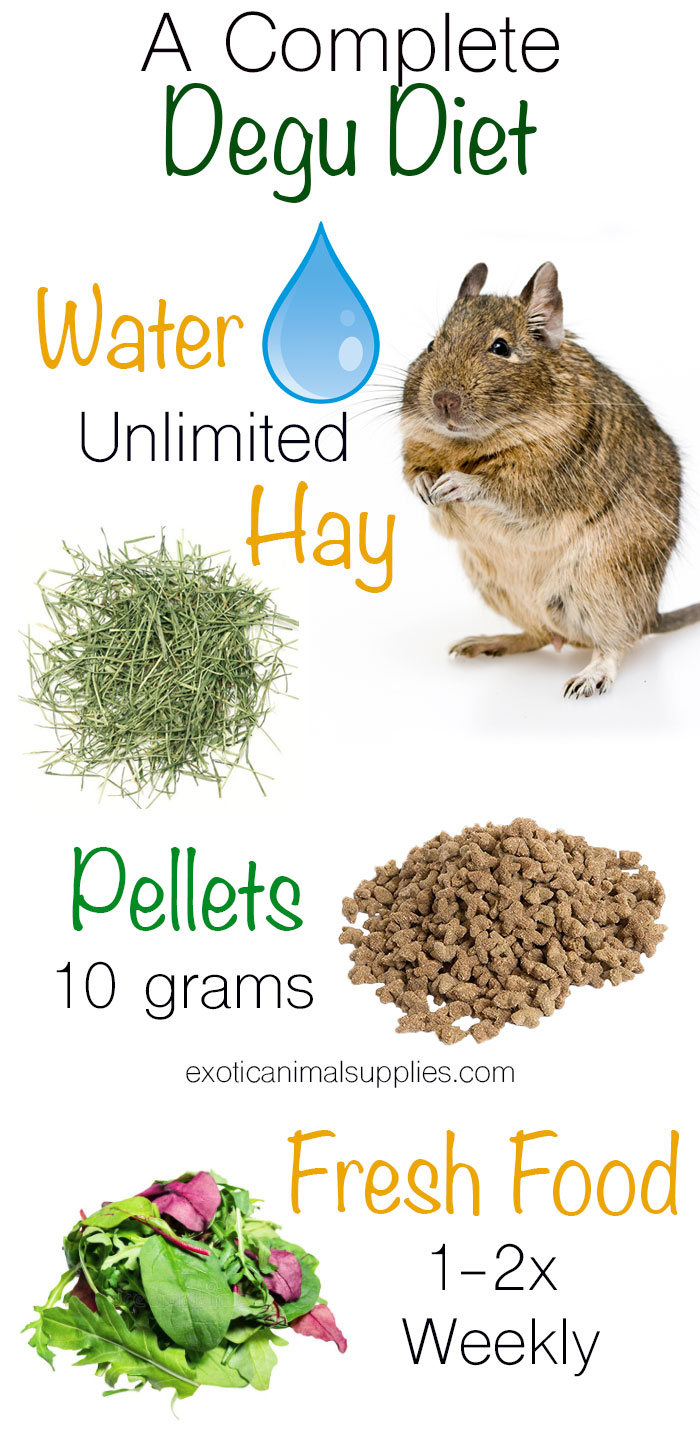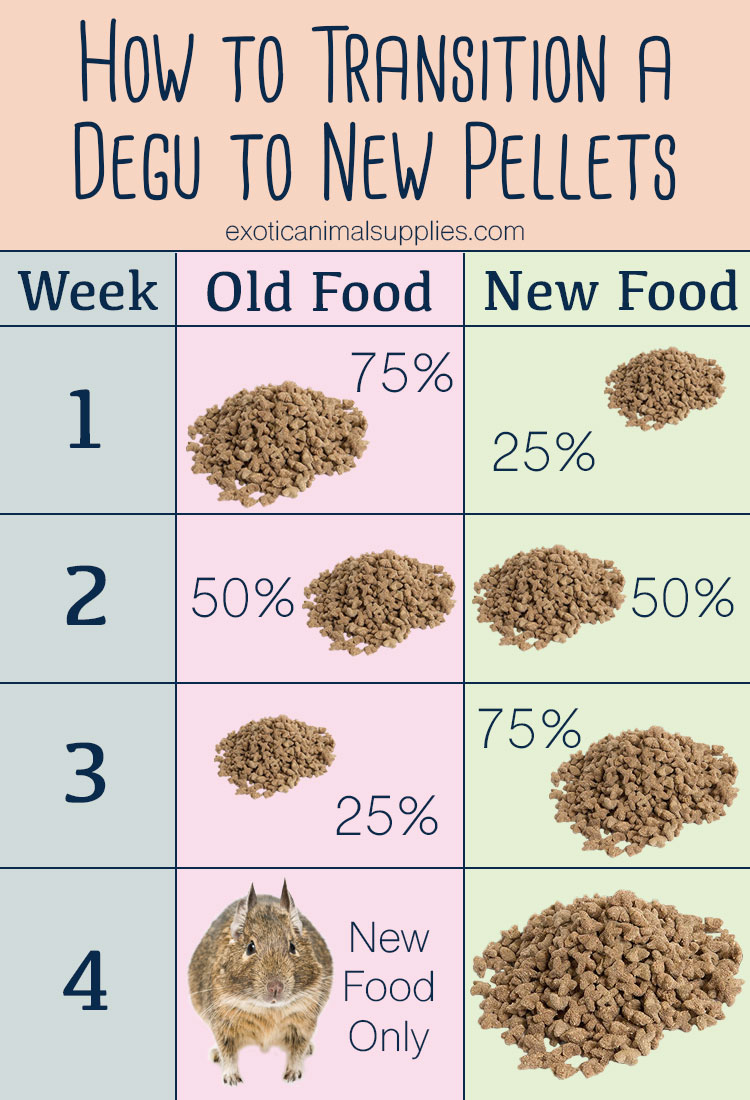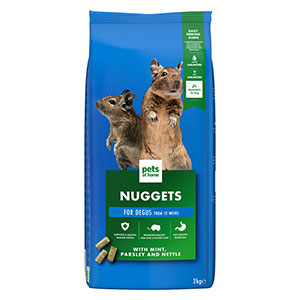
One of the most important things you can do for your degu’s health is to provide them with a proper diet. While degus do have specific health needs to address and prevent with their diet, they are not complicated to feed. Once you understand the basics, you’ll easily be able to provide your pet with the nutrients they need.
What do Degus Eat?
A degu’s diet is broken up into four main parts: fresh water, hay, pellets, and fresh vegetables. Your degu should always have hay and water available in their cage. Pellets are fed daily and once a week they should have a variety of fresh vegetables to supplement the nutrients in their dry feed.
The nutritional needs of degus are generally simple, but you should avoid sugar in their diet. They are prone to type 2 diabetes and required a diet that is low in sugar and fat. Sugary treats and fruit should be limited to monthly or avoided compeltely.
Water
Fresh water should be provided in a chew proof water bottle. While degus are from an arrid environment and can go long periods of time without water, your pet degu should have unlimited access to their water bottle. Any water that is safe for human consumption is safe for your degu, including tap water. I prefer to provide filtered tap water. Make sure to change the water every few days even if the bottle isn’t empty to keep it fresh and prevent algae growth in the bottle.
Hay
Hay is the main part of their diet and should be fed to them constantly through a hay rack or holder in their cage. For degus, hay provides roughage and fiber plus it keeps their gut moving. Hay also helps degus wear down their molars, which continuously grow. The best hays for degus are meadow hay and timothy hay. A small amount of alfalfa hay can also be offered to provide variety but because of the high protein and calcium content it can cause kidney stones if eaten in excess. We’ve shared our favorite hay brands below.
Hay is often sold in large quantities and should be stored in a dry place with plenty of airflow to keep it from getting damp and moldy.
Pellets
Pellets are an important part of a degu’s diet since it provides your pet with the vitamins, minerals, and nutrients they need. The best choice is to buy a healthy degu specific pellet which contains pellets only and has no additional nuts, seeds, or colored food pieces. Most pets will pick out the “treats” in those types of mixes and ignore the pellets that have all the nutrients. For degus, these “treats” can cause spikes in blood sugar levels and other health problems. Make sure the degu food you select does not have molasses and is generally low in sugar. See the section on Degu Pellets below for our recommended brands.
Degus are best fed their pellets on a consistent schedule. They thrive on a regular routine and schedule so they always know when their food is coming. Each degu should get 10g of pellets daily, though it can be divided into two 5g meals, fed in the morning and early evening (matching their crespuscular rhythm).
If you have multiple degus, feeding them each with their own bowls will help reduce squabbling and help you track their eating.
You may notice your degus “hiding” food around their cage. This is a normal behavior. Since they are natural foragers in the wild, you can hide some food around their cage or in their hay to provide some enrichment.
Vegetables
Fresh vegetables and herbs are another important part of your degu’s diet since they provide essential amino and fatty-acids that aren’t available in pellet food. Once a week you should offer your degu a small bowl with a variety of fresh vegetables. Cut each vegetable into a thumbnail size piece. Many degus are picky eaters, so a variety will help you learn what your degus like and give them a mix of nutrients. Too many fresh vegetables in a degu’s diet can cause diarrhea and bloat, which is why it should be limited to one day a week. Since fresh fruit is high in sugar it can only be given in small amounts one time a month as a treat. Check out the section of fresh vegetables for a list of degu safe choices.
Treats
Treats can be provided as a very small part of your degu’s diet. They are useful for training and helping you bond with your new pet. Make sure you are giving treats only once a day (or less) and that you are giving healthy treats with no sugar. (Treats with sugar like an apple piece should be given once a month at most.) See our recommended options in the Treats section below.

Transitioning to New Degu Pellets
Just like other parts of your degu’s diet, consistency is best. Ideally, you will select a healthy brand of pellets that is easy for you to purchase and your degu will eat it their whole lives. But degus can be picky eaters and sometimes you need to switch brands.
Changing pellets should happen as a slow transition, while no other changes are made to your degu’s diet. You may need to plan in advance to make sure you have enough of the old degu food on hand to make the smooth transition. While you are changing from one food to another, keep an eye on your degu’s stool. If it starts to get soft or mushy, then you are changing too quickly.
The absolute best way to transition your goos to new pellets is slowly over 3 weeks. Follow this schedule:
- Week 1: Feed 75% of the old pellets and 25% of the new pellets each day.
- Week 2: Feed 50% of the old and 50% of the new pellets each day.
- Week 3: Feed 25% of the old and 75% of the new pellets each day.
- Week 4: If your rabbit has no problems, feed the new pellets exclusively.
Occasionally, you may have a degu that refuses to transition to the new food. Instead, they will pick out the old pellets and leave the new ones uneaten. In that case, you may want to continue to feed the old food (as long as it is healthy and meets your degu’s nutritional needs) or try a different brand.
Use this infographic as a handy guide:

Degu Food Recommendations
Degu Pellets
Because Degus are a less common pet, it is hard to find appropriate food for them in pet stores in the US and other countries. Degu owners in the UK have the best selection of pellets available. Our best recommendation is to order the appropriate pellets for them online.
If you absolutely cannot find these degu foods where you live, you can feed degus chinchilla food, but make sure the food doesn’t contain molasses.
Science Selective Supreme Petfoods Degu Food
Considered the best degu food available, these pellets from Science Selective are specially formulated for degu’s needs. Made from a blend of high quality ingredients, including broccoli and basil, it’s packed with vitamin C and has zero added sugar and no artificial colors.
This is a plain pellet with no added junk like seeds or dried fruit, which means your degu won’t be picky and will have a better balanced diet.
Exotic Nutrition Degu Complete
Another favorite among degu owners and easier to buy in the US, Exotic Nutrition’s Degu Complete pellets is formulated specifically for your goo’s dietary needs. These pellets are vitamin fortified and have a hard texture to encourage chewing and good dental health.
This food does feature whole oat seeds in it which can be a distraction for some degus. Make sure they are eating the pellets and not just picking out the seeds.
Pets at Home Degu Nuggets
A great option for degu owners in the UK is Pets at Home’s Degu nuggets. These nuggets are high in fiber and have added vitamin and minerals to support your goo’s dietary needs with no added sugar. This is a plain pellet food, so there are no added seeds, nuts, or colored pieces, meaning your degu will just get the healthy food they need.
Degu Hay
Fresh hay should be available at all times for your degus. The best hay for degus is timothy hay and meadow hay. Alfalfa hay can also be fed in small quantities for variety. Here are some of our favorite suppliers of hay.
Some suppliers of timothy hay offer a choice of “cut” either first, second, or third cutting. These stand for which crop of hay it came from during the growing season. Generally, the second cut is the best as it has a good balance of nutrients and fiber.
Oxbow Degu Hay
Oxbow is my personally preferred brand of hay. They offer a variety of hays that are good for degus and can be found in some local and national pet stores. Their hay is grown in the USA and hand selected to ensure good quality products.
The options they offer for degus include:
- Timothy Hay (Check Price at Petco | Check price on Amazon)
- Meadow Hay (Check price on Amazon)
- Alfalfa Hay (Check Price at Petco | Check price on Amazon)
Small Pet Select Hay
Small Pet Select is a smaller hay and food distributor on the small animal scene, but they are used by many exotic pet owners and are a good brand to consider for your degu’s hay. They also pack and ship their hay in a cardboard box, which is the best long-term storage option for keeping hay. They offer timothy hay in 1st, 2nd, and 3rd cuttings–we recommend buying the 2nd cutting.
Here are their degu hay options:
- 2nd Cutting Timothy Hay (Check Price at Small Pet Select | Check price on Amazon)
- 3rd Cutting Timothy Hay (Check Price at Small Pet Select)
- Alfalfa Hay (Check Price at Small Pet Select)
Kaytee Hay
Kaytee is one of the most common brands of hay and food available, often seen in national pet store chains. They’re also usually the cheapest. Many exotic pet owners complain about the freshness or getting a bad batch, but we have used it without issue. (When buying any hay you should check the freshness and quality of it before feeding it to your pet.)
Kaytee offers the following hay options that are appropriate for degus:
- Timothy Hay (Check Price at Petco | Check price on Amazon)
- Alfalfa Hay (Check price on Amazon)
Vegetables and Greens for Degus
Once a week you should offer your degus a variety of fresh vegetables and greens to supplement their daily diet of pellets and hay. Cut the vegetables into thumbnail size pieces. You should feed each degu enough vegetables to cover the bottom of a 1 cup measuring cup.
Make sure to wash any store bought vegetables and herbs thoroughly before you feed them to your degu. If you can, buy organic veggies.
Since degus are picky eaters they will often ignore the fresh foods. You can sprinkle the top of them with a small amount of rolled oats or dried herbs to get your goos interested.
Here are some vegetables and herbs to consider offering your degus.
Fresh Herbs
- Basil
- Borage
- Camomile
- Chervil
- Chives
- Comfrey
- Coriander
- Cress
- Dill
- Lemon Balm
- Mint
- Oregano
- Parsley
- Peppermint
- Purple Coneflower
- Rosemary
- Sage
- Tarragon
- Thyme
Greens & Veggies
- Agrimony
- Beet Greens
- Cabbage (White, Red, Savory)
- Carrot Tops (greens only)
- Cauliflower (leaves only)
- Celery (including leaves)
- Chard
- Chicory
- Chives
- Cress
- Dandelion Greens
- Echinacea Leaves
- Kale
- Lemon Grass
- Lettuce (Romaine, Sweetheart, Green Leaf, Red Leaf)
- Meadow Sweet
- Mustard Greens
- Pak Choi
- Pea Shoots
- Pumpkin Leaves and Flowers
- Spinach
- Wild Rocket Arugula
- Yarrow
Veggies to Feed Sparingly
- Broccoli
- Burdock Root
- Carrots*
- Cucumber
- Dandelion Root
- Jerusalem Artichoke
- Marshmallow Root
- Nettle Root
- Okra
- Parsnip
- Peas*
- Sugar Snap Peas
- Sweet corn*
*Indicates the item is high in sugar and should be fed sparingly
Degu Treats
Treats are the fun part of a degu’s diet. Usually fed by hand they’re a great way to help you bond with and even train your goos. Because they’re so tastey, degus will often beg for treats but you must be careful to feed treats sparingly. Your degu should receive, at most, 1 small amount of treats per day. You can offer the vegetables listed in the “Veggies to Feed Sparingly” list above as treats once a month.
While some pet store purchased treats are safe for degus, it’s often easier just to give them simple treats like apple, nuts, and seeds. (Be very careful with fruit because of the high sugar content). Here are some recommended treats.
Recommended Treats
- Adzuki Beans
- Green Lentils
- Hemp Seeds
- Milk Thistle Seeds
- Millet
- Pumpkin Seeds
- Rolled Oats
- Rosehips (dried)
Nuts for Degus
- Almonds
- Brazil nuts
- Cashews (unsalted natural)
- Hazelnuts
- Macadamia
- Peanuts (no shell)
- Pecan
- Pine nuts
- Walnuts
Make sure to check out the list of degu safe woods to buy appropriate chews and cage accessories.
Use the best degu bedding to control odors in your cage.
Be prepared for sickness or injury with a degu first aid kit.






